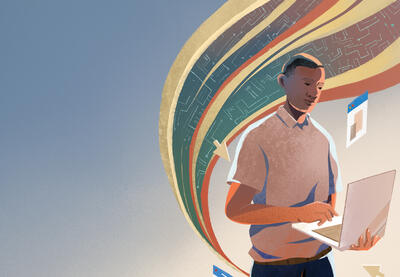In the magazine story “Reimagining Digital Literacy Education to Save Ourselves,” digital literacy, critical media literacy, media literacy and news literacy experts make a case for education as a key safeguard against online hate and misinformation crises affecting communities around the world. They argue for an updated and upscaled digital literacy model that centers issues of social justice and identity; that teaches skills proven to help students navigate today’s media ecosystem; and that engages with the power structures that historically and presently inform the narratives students encounter online.
Traditional media literacy resources often don’t meet these needs. This toolkit features digital literacy resources mentioned in the story and recommended by featured experts—resources that educators can integrate across all subject areas. These resources are designed to meet present-day challenges in navigating online information and countering online hate, as well as to provide spaces for students to use digital tools for good.
We hope these digital literacy resources prove useful to you as we collectively reimagine what it looks like to educate future generations of online citizens, stem the harms of online misinformation and hate, and protect the promises of our diverse democracy from the threat of white supremacy.
Featured Resources
Learning for Justice
Digital Literacy Framework
The Learning for Justice Digital Literacy Framework offers seven key areas in which students need support developing digital and civic literacy skills. The framework includes K-12 lessons for each key area.
Digital Literacy Videos
These short, student-friendly videos (and accompanying discussion questions) introduce key digital literacy concepts and skills in a fun, approachable way.
The Mind Online
Through conversations with teachers, librarians, scholars and reporters, this podcast for educators explores the critical aspects of digital literacy that shape how we create and consume content online—and how we can all become safer, better informed digital citizens.
Preparing to Teach Digital Literacy
This professional development module offers a series of activities designed to help educators brush up their own digital literacy knowledge. Educators can also watch an on-demand webinar that introduces our digital literacy lessons and key strategies for supporting responsible digital citizens.
Speaking of Digital Literacy
This glossary introduces educators and students to key terms that help us understand how misinformation spreads and how our brains process that information. The list defines several cognitive biases that affect how information spreads online.
IREX
Learn to Discern: Media Literacy Trainer’s Manual
“The Learn to Discern: Media Literacy Trainer’s Manual (PDFs in English and Georgian) is a curriculum for educators in formal and informal education environments. It provides step-by-step guidance and interactive exercises for helping learners of all ages recognize why and how manipulative content works and gain skills to reject half-truths, clickbait, hate speech, and fakes.” IREX also offers training in using the curriculum.
Webinars
IREX has three previously recorded webinars on understanding and teaching digital media literacy, including strategies for helping students verify information and images.
Civic Online Reasoning (from Stanford History Education Group)
COR Curriculum
The Civic Online Reasoning curriculum includes free, classroom-ready lessons, collections and assessments designed to help students learn modern fact-checking skills and evaluate online information.
Videos
COR’s videos include explanations of skills, examples of COR usage in the classroom and “crash courses” that are useful for both educators and students.
Critical Media Project
Playlists
Critical Media Project’s curated playlists help students understand how media narratives intersect with different identities and social justice issues—and offer ways to disrupt and push back against dominant narratives.
DIY Activities
“These activities can be used in conjunction with specific media examples on CMP or more generally used to elicit class discussion and critical thinking. It may be useful to review the section that overviews key concepts tied to each identity and consider how we understand our identities and the ways our identities are shaped by media.”
News Literacy Project
Checkology
This free, browser-based platform with lessons, real-world examples and other resources teaches students “how to identify credible information, seek out reliable sources, and apply critical thinking skills to separate fact-based content from falsehoods.”
Resource Library
This collection includes classroom activities, lessons, quizzes, training materials, videos and posters for educators.
Common Sense Education
Digital Citizenship Curriculum
This curriculum provides K-12 lesson plans to “prepare students to take ownership of their digital lives” and covers topics like media balance, cyberbullying and online hate speech.
Media Smarts
Use, Understand and Create: A Digital Literacy Framework for Canadian Schools
This Canadian organization’s framework provides scaffolded lessons across K-12 grade bands. These lessons—which are relevant and useful for U.S. and global audiences, as well—engage with issues like representation, countering online hate and social and political implications of media bias.
Polarization and Extremism Research Innovation Lab (PERIL)
Building Resilience & Confronting Risk in the COVID-19 Era
This guide—receiving ongoing updates to provide support for stakeholders like educators—offers guidance for recognizing and challenging risks posed by online radicalization and recruitment by extremists, and resources for building students’ strength against those efforts.
KQED
Media Literacy
“Through tools, workshops, and in-class materials and programs, you can encourage your students to ask key questions about who creates media messages, why, and to what effect.” KQED’s offerings include key concepts, resources for different subject areas, frameworks and professional development.
